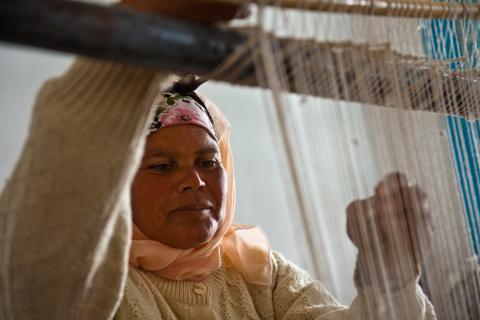
UN DESA experts are working to help decision makers around the world navigate tough choices and to find ways to recover better from the COVID-19 crisis and prepare for complex and compounded risks in today's interconnected world.
Watch this space for the latest research, analysis and policy advice from UN DESA, an effort to support and complement the United Nations Secretary-General’s initiatives in response to the COVID-19 crisis, Decade of Action to deliver the Sustainable Development Goals and call by the Member States to advance Our Common Agenda.
UN/DESA Policy Brief #115: Horizontal and vertical integration are more necessary than ever for COVID-19 recovery and SDG implementation
Integrated policy-making has been critical in responding effectively to the pandemic, and will be paramount in post-COVID recovery to realize the Sustainable Development Goals.
UN/DESA Policy Brief #114: Connecting the dots: The still elusive synergies between accountability institutions and the follow-up and review of the Sustainable Development Goals
Strengthening such integration can contribute to more holistic SDG monitoring efforts and strengthen accountability for progress on the SDGs. This seems particularly relevant in the context of COVID-19, as countries must urgently address the significant and differentiated impacts of the pandemic on SDG implementation.
UN/DESA Policy Brief #113: Digitally enabled new forms of work and policy implications for labour regulation frameworks and social protection systems
Social protection systems need to adapt to ensure no worker is left unprotected in a future world of work transformed by digital technology.
UN/DESA Policy Brief #112: Harnessing longevity in the future of work
Promoting the inclusion of older persons in the new realities of work requires addressing barriers in their access to decent work, including discrimination and participation in informal employment.
UN/DESA Policy Brief #111: Wildfires – a growing concern for sustainable development
This policy brief reviews trends and impacts of wildfires on sustainable development. It provides an analysis of the key drivers of wildfires and proposes measures to reduce the risk and impacts.
UN/DESA Policy Brief #110: Time for transformative changes for SDGs: what the data tells us
COVID-19 has had a devastating impact on the implementation of the 2030 Agenda, undermining decades of development efforts. The crisis has pushed hundreds millions of people back into poverty.
UN/DESA Policy Brief #109: Accelerate action to revamp production and consumption patterns: the circular economy, cooperatives and the social and solidarity economy
Achieving sustainable development requires determined actions to revamp production and consumption patterns, creating a resource-efficient and resilient post-pandemic recovery.
UN/DESA Policy Brief #108: Trust in public institutions: Trends and implications for economic security
Economic insecurity—which the COVID-19 crisis threatens to exacerbate—and perceptions of poor or corrupt government performance undermine the social contract and are closely linked to declines in institutional trust.
UN/DESA Policy Brief #107: Social protection in rural areas: achieving universal access for all
Government action is required to ensure social protection measures, including floors, are available for all in rural areas.
UN/DESA Policy Brief #106: Reducing poverty and inequality in rural areas: key to inclusive development
Countries that have succeeded in reducing both rural poverty and inequalities have promoted inclusive agricultural growth, access to land and social protection in rural areas, and paid special attention to the needs of the most vulnerable.
UN/DESA Policy Brief #105: Circular agriculture for sustainable rural development
The strengthening of institutions and incentives such as water user associations and secure water and tenure rights, along with enhanced international cooperation, can spur greater application of circular approaches in agriculture.
UN/DESA Policy Brief #104: In situ urbanization key to leaving no one behind
Expanding opportunities in non-farm activities in rural areas is a key for sustainable development without “leaving no one behind”. Where the typical farmers are small landowners, technology alone may not be able to help farmers escape from poverty, and technical advances need to be complemented by a holistic approach.
UN/DESA Policy Brief #103: Transformational partnerships and partnership platforms
Multi-stakeholder collaboration has proven to be critical to tackle the challenges posed by the COVID-19 pandemic and will be essential in the recovery efforts to ‘build back better’ towards more sustainable, resilient and inclusive societies.
UN/DESA Policy Brief #102: Population, food security, nutrition and sustainable development
Despite progress in recent decades, in 2019, almost 690 million people, or 8.9 per cent of the global population, were undernourished. After more than a decade of steady decline, the number of undernourished people has been rising since 2014.
UN/DESA Policy Brief #101: Challenges and Opportunities for Indigenous Peoples’ Sustainability
Indigenous peoples contribute to mitigation and adaptation strategies including successful struggles against deforestation, mineral, oil and gas extraction in their ancestral lands; their fight against further expansion of monocrop plantations; their promotion of sustainable production and consumption systems through traditional knowledge and values of reciprocity with nature.
UN/DESA Policy Brief #100: Effective blended finance in the era of COVID-19 recovery
While blended finance can be an option to support post COVID-19 recovery efforts, a new approach to blended finance is necessary to improve its impact.
UN/DESA Policy Brief #99: Why does corporate sustainability reporting matter to rebuilding better?
Business and financials models must be rethought to accelerate and strengthen business’ contributions to sustainable development
UN/DESA Policy Brief #98: Risk-informed finance
All financing must be risk-informed and resilient, and sufficient financing must be available for investments in risk reduction and resilience, at national and global levels.
UN/DESA Policy Brief #97: COVID-19 and Beyond: Scaling up Private Investment for Sustainable Development
Further action is needed to better channel investment to countries and SDG-related sectors that are most in need. The development of innovative and scalable global platforms, instruments and funds would be an important first step in this regard.
UN/DESA Policy Brief #96: COVID-19: How the data and statistical community stepped up to the new challenges
New partnerships have been crucial in responding to new data demands, helping National Statistical Offices introduce measures that are permanently changing the statistical production process in many countries.
 Welcome to the United Nations
Welcome to the United Nations
